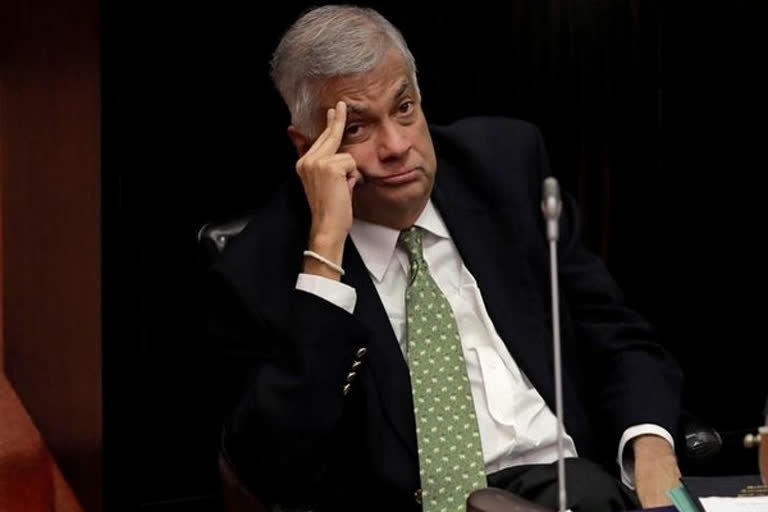Colombo: Sri Lankan Prime Minister Ranil Wickremesinghe on Wednesday said the country has missed a payment to the Asian Development Bank, blocking fresh funds amid warnings that the currency crisis-hit country could be locked out of multilateral funding in a new blow. The ADB as well as the World Bank had just promised around 160 million each to Sri Lanka, Wickremesinghe said, but the loan from the Manila-based lender was blocked.
Because we could not repay three million US dollars last month it is stuck, Economy Next news service website quoted Wickremesinghe as saying. The Prime Minister said his cabinet was "finding money for that". The ADB and the World Bank also continued to fund Sri Lanka by repurposing loans after the country was cut off from capital markets when it was downgraded to CCC. Sri Lanka now faces the prospect of being locked out of multilaterals, if their repayments are not maintained, the report said.
Former finance minister Ali Sabry said in Parliament that new funding would not come until the country paid the International Monetary Fund (IMF), as well as, the World Bank. Sabry said the failure to pay the international institutions such as the IMF and the World Bank was a "problem". "As the Prime Minister said there are some payments due to ADB. It is a very big problem. Sri Lanka has already suspended repayments for international sovereign bonds, commercial bank loans, Exim bank loans, and bilateral loans. However, multilateral lenders and senior creditors were excluded.
He added that the country had on April 12 decided not to pay ISBs (International Sovereign Bond) and everyone else except multilaterals because the country had no option. Sabry added that the country had to pay USD 78 million by April 18 to the ADB and USD 105 million to another Chinese bank. "We announced and defaulted." Sri Lanka is now negotiating a loan with the IMF. The country had to pay USD 106.34 million this year but only managed to pay USD 12.4 million by April.
The Prime Minister then said the debt-ridden country could not even pay a million dollars. Whether the payment is a billion or 10 billion we do not have a million to pay, Wickremesinghe said, promising to provide statistics to the parliament soon. Opposition legislator Harsha de Silva said the country was due to pay about USD 5.5 billion in 12 months, of which USD 2.5 billion was suspended, leaving about USD 3 billion to be repaid. The country's central bank is also deep in debt owing money to the IMF as well as the Reserve Bank of India and swap counterparties.
Sri Lanka was hit by chronic monetary instability between 2015 and 2022 as money was printed to keep interest rates down under "flexible inflation targeting" and "output gap targeting", triggering three currency crises, excessive foreign borrowing, and eventual default. Wickremesinghe on Wednesday also told Parliament that five members of his Cabinet will soon meet to approve the appointment of financial and legal advisors to carry out discussions on debt restructuring. The finance minister and I can go through the names nominated by the central bank and others for the financial and legal committees and the five members of the cabinet will approve the names, the Prime Minister told Parliament.
The Daily Mirror website cited the prime minister making the statement in a response to remarks by Sabry who said the appointment of financial and legal advisors had come to a standstill because the island nation did not have a full cabinet at the time when the economic crisis hit the country and went into hard default of loans. When asked by de Silva about the cross default payments, the prime minister said that it was hard to come out with an exact amount.
Also read: Embattled Sri Lankan President Gotabaya Rajapaksa defeats no-confidence motion
Dr de Silva said: "Sri Lanka is said to have gone into hard default status today... it is said that there are cross-default clauses worth more than USD 11 million. Also, Sri Lanka has failed to appoint financial and legal experts to get on with debt restructuring." Some statistics which are available are wrong. Statistics have gone haywire, the prime minister replied. Sri Lanka is going through the worst economic crisis since independence in 1948. A crippling shortage of foreign reserves has led to long queues for fuel, cooking gas, and other essentials while power cuts and soaring food prices heaped misery on the people.
Earlier in the day, the newly appointed prime minister told the parliament that Sri Lanka has received USD 160 Million from the World Bank and that the country is looking at the possibility of using some of the amounts to buy fuel. Angry protesters have blocked several roads here against ongoing fuel and gas shortages caused by the economic crisis. Miles-long queues were seen around every fuel station. The economic crisis also triggered a political crisis in Sri Lanka and a demand for the resignation of the powerful Rajapaksas. President Gotabaya Rajapaksa sacked his Cabinet and appointed a younger Cabinet as a response to the demand for his resignation. A continuous protest opposite his secretariat has now gone on for well over a month. On May 9, Gotabaya Rajapaksa's elder brother Mahinda Rajapaksa resigned as the prime minister to make way for the president to appoint an interim all political party government. Wickremesinghe was appointed the country's new prime minister last Thursday.
PTI



